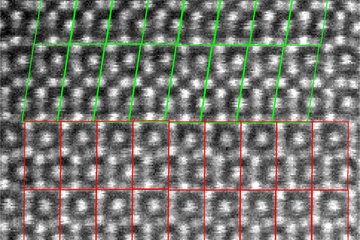All genres
1.
Journal Article
Directed energy deposition of γ/γ' Co–Al–W superalloys. Additive Manufacturing 60, 103287 (2022)
2.
Journal Article
Shear band-driven precipitate dispersion for ultrastrong ductile medium-entropy alloys. Nature Communications 12 (1), 4703 (2021)
3.
Journal Article
Orientation-dependent plastic deformation mechanisms and competition with stress-induced phase transformation in microscale NiTi. Acta Materialia 208, 116731 (2021)
4.
Journal Article
Enhancement of the tensile properties and impact toughness of a medium-Mn steel through the homogeneous microstrain distribution. Materials Characterization 174, 110992 (2021)
5.
Journal Article
Effects of Mo on the mechanical behavior of γ/γʹ-strengthened Co–Ti-based alloys. Acta Materialia 197, pp. 69 - 80 (2020)
6.
Journal Article
Atomistic deformation behavior of single and twin crystalline Cu nanopillars with preexisting dislocations. Acta Materialia 197, pp. 54 - 68 (2020)
7.
Journal Article
Effects of transformation-induced plasticity on the small-scale deformation behavior of single crystalline complex concentrated alloys. Scripta Materialia 176, pp. 122 - 125 (2020)
8.
Journal Article
Ultrastrong Medium‐Entropy Single‐Phase Alloys Designed via Severe Lattice Distortion. Advanced Materials 31, 1807142 (2019)
9.
Journal Article
On the nature of twin boundary-associated strengthening in Fe–Mn–C steel. Scripta Materialia 156, pp. 27 - 31 (2018)
10.
Journal Article
Unraveling the Nature of Sites Active toward Hydrogen Peroxide Reduction in Fe–N–C Catalysts. Angewandte Chemie International Edition 56 (30), pp. 8809 - 8812 (2017)
11.
Journal Article
Effect of Carbon on the Damping Capacity and Mechanical Properties of Thermally Trained Fe–Mn Based High Damping Alloys. Materials Science and Engineering A: Structural Materials Properties Microstructure and Processing 700, pp. 641 - 648 (2017)
12.
Journal Article
Dislocation interaction and twinning-induced plasticity in face-centered cubic Fe–Mn–C micro-pillars. Acta Materialia 132, pp. 162 - 173 (2017)
13.
Journal Article
Direct Resistance Joule Heating of Al-10 pct Si-Coated Press Hardening Steel. Metallurgical and Materials Transactions A 47 (6), pp. 2875 - 2884 (2016)
14.
Journal Article
Microstructure evolution of a 55 wt.% Al–Zn coating on press hardening steel during rapid heating. Surface and Coatings Technology 281, pp. 35 - 43 (2015)
15.
Journal Article
Size and orientation effects in partial dislocation-mediated deformation of twinning-induced plasticity steel micro-pillars. Acta Materialia 98, 12304, pp. 391 - 404 (2015)
16.
Talk
Dislocation interaction and twinning-induced plasticity in face-centered cubic Fe–Mn–C micro-pillars. MRS Fall Meeting , Boston, MA, USA (2017)
17.
Talk
Dislocation interaction and twinning-induced plasticity in face-centered cubic Fe–Mn–C micro-pillars. MECANO General Meeting, Toulouse, France (2017)
18.
Talk
Size and orientation effects on the elasto-plastic transition and deformation mechanism of twinning-induced plasticity steel micro-pillars. MSE 2016 Conference , Darmstadt, Germany (2016)
19.
Poster
The effect of size-independent strength on the size effect in micro-compression tests. MRS Fall Meeting, Boston, MA, USA (2017)
20.
Thesis - PhD
Deformation mechanisms and the role of interfaces in face-centered cubic Fe-Mn-C micro-pillars. Dissertation, RWTH Aachen, Aachen, Germany (2018)











